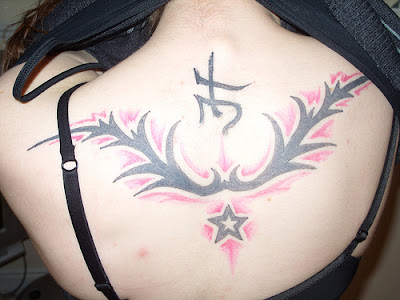 I've seen a lot of people, including famous ones like David Beckham, wear Chinese calligraphy on their bodies. It seems that if you have a Chinese tattoo symbol on your arm, shoulder blade, wrist, or wherever else you'd want a tattoo, you're considered popular. Well, I can't blame them, especially Westerners.
I've seen a lot of people, including famous ones like David Beckham, wear Chinese calligraphy on their bodies. It seems that if you have a Chinese tattoo symbol on your arm, shoulder blade, wrist, or wherever else you'd want a tattoo, you're considered popular. Well, I can't blame them, especially Westerners.There's a certain mystery enveloping the beautifully complex Chinese characters. The fact that a lot of people don't know or aren't familiar with the meaning of these characters attracts more attention to the person wearing the tattoo. One can't help but wonder what those characters mean, and what relevance those meanings have for the person who wears them.
The top symbols that are used for tattoos are the symbols of the Chinese zodiac and the symbols for love, strength, faith, friendship, family, happiness, peace, hope, and lastly, luck. These choices reflect what people desire for themselves, for their lives, or what they believe best reflects their personalities, narrates their experiences, or asserts their identities. These are one of the perks of having a Chinese tattoo symbol and it can make you wonder why the Chinese or most Asians themselves don't have them.
Well, try imagining that you're a native English speaker and you have the word "love" tattooed on your arm. Some fancy having a dragon tattoo and having the Chinese character for dragon tattooed alongside it. It's like having a picture of a dragon labeled "dragon". Chinese and Asians usually prefer to have tattoo symbols of animals or flowers.
A Chinese tattoo symbol used as a tattoo can either be Chinese calligraphy or Chinese writing. This is an important consideration since there is a difference between the two. Chinese calligraphy is not just words or writing; it depicts emotion, mood and thought, and can be as much a picture as words, so that it would be best, aesthetically speaking, to choose Chinese calligraphy over Chinese writing. One site gave seven kinds of Chinese calligraphy, two of which are used as tattoo designs -the Kaishu style (or the formal or regular style) and the Lishu style (or the official clerical style).
One should be careful in using Chinese characters as tattoos. Because not all Chinese words, ideas, proverbs or philosophies can be directly translated into English and vice versa, there have been a lot of hilarious and embarrassing mistakes after having a Chinese tattoo symbol done. Usually, the mistakes come from using translator engines found on the Internet that inaccurately translate English words or ideas into Chinese. An example of this is the word "freedom" being translated into "cheap". Getting help from a native speaker is advisable over having translations done through the Internet.
Having a Chinese tattoo symbol has gained wide popularity mostly among Westerners who may find these characters, with their complexity and deeper meanings, exotic and beautiful. It helps them express themselves, their identities and experiences. For those who are interested in getting tattoos with Chinese symbols, make sure to consult a native Chinese speaker to avoid mistakes and embarrassment in indelible art.
No comments:
Post a Comment